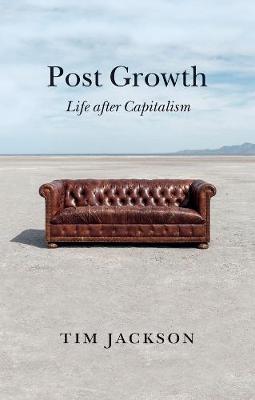

This book isn’t perfect, by any means. Occasionally dazzled by his own prose, and prone to that impressive but somewhat cloying tradition of drowning in quotations, Tim Jackson may also be in danger of only preaching to the converted.
Like Karl Marx before him, he puts forward a damningly cogent and incisive critique of Capitalism. Where he diverges from Marx is in both his more florid and emotional tone, a more up to date view of neo-liberal capitalism, and his proposed answers to the vexatious questions that some of the more obvious failures of capitalism pose.
Several key concepts emerge, such as virtue (understood here in an older more Aristotelian form, rather than the current yet rather Victorian sense), working wisely within limits (as opposed to simply ignoring them), and the slightly more vague-sounding balance and flow.
Countering the very dominant neo-Darwinian (or should that really be Spencerian?) 19thC ‘law of the jungle’ style models of Capitalism, and exposing them for the inherently flawed myths they are, Jackson says the only sustainable way beyond capitalism is a ‘post growth’ vision that learns wisdom by acknowledging limits.
That such ideas are being openly discussed nowadays is quite reassuring. But sadly, with the recent/current eras of Trump in the US and Boris and co in the UK, TJ’s wisdom of balance within limits still looks and feels rather like a utopian pipe-dream, struggling against myths that, for whatever twisted tragic reasons, like weeds, take root and multiply so much more readily than do the more attractive flowers of wisdom.
There are occasional moments where I find myself quibbling with certain key readings of history within his narrative. But overall his arguments are, at least to me, pretty compelling and essentially sound. But then I’m not amongst the rapine disaster capitalists that need to be ‘converted’ by such reasoning.
This said, even as someone who considers themself very in tune with TJ’s thinking and desires, regarding a better future for humanity, this book has helped shine a light on how inescapably insidious so much of contemporary capitalist life is. From my own seeking of solace in over-consumption – both in literal dietary terms and the more metaphorical but equally material terms of ‘I shop therefore I am’ – to the devastation of the mental and ‘spiritual’ life Capitalism wreaks, as it devalues labour and marginalises dissenters.
This book is a wake up call to all of us, from the cowed victims, like me, hiding in the margins eking out a subsistence life, away from the glare of the capitalist mainstream, to the ‘captains of industry’ and their apologists and enablers, merrily driving humanity over a cliff of short-sighted short-termist greed.
I do think the ideas presented here need to somehow be successfully communicated to ‘the enemy’, the Trumps, Bojos and their hordes of zombie enablers. And as most of them don’t even read, let alone read this sort of book, that’s where TJ’s vision falters. One can imagine, or rather hear already, the contemptuous dismissals such ideas as are presented here will typically encounter from the currently dominant Capitalists.
As someone who has dallied with Buddhism for many years, it was interesting that, towards the end of this book, a Buddhist perspective was used as a positive foil to contrast with capitalism: both, as TJ points out, start with a vision of life beset by suffering, but the responses are very different. This section was kind of nice for me, on an almost personal level, as I’d become very disillusioned with Buddhism in the end. And this has reminded me that I wasn’t actually wasting time, as some of the philosophical aspects of Buddhism are, as it turns out, potentially useful antidotes to some of the ills of capitalism.
As is often the case with books like this, at the end it reaches an almost rhapsodic climax of peroration. I always get a little queasy at this point. It’s as if the authors of such ‘visionary’ writings have to whip themselves and, they hope, their readers, into a kind of rapt ecstasy. To finish on an orgasmic high! To stick with the sex metaphor, the more frequently one encounters such intense !happy endings’ the more quickly ecstasy potentially slips into ennui, leaving a lingering sense of uncertainty. Was that really as good as it tried to be?
Anyway, for all my caveats and criticisms, in short, this really is a superb and very timely work. Drawing together numerous fascinating insights, ranging across everyone from good ol’ Aristotle, philosopher of the Classical Greek era, on virtue, to the more contemporary work of biologist Lyn Margulis, on the essential role of collaboration at the heart of evolutionary progress.
And – always a good sign, in my books (boom-boom, pun fully intentional!) – this book has really stimulated a desire to read further on numerous related topics: be that The Limits of Growth, by The Club of Rome ‘think tank’, to the powerful poetic writings of Emily Dickinson.
This book challenges both the individual and society to substitute old and poisonously unsustainable myths with better healthier narratives, and thereby enable positive change. And both we as a species, and the planet on which we depend, need humanity to awaken to the urgency of such change. Great stuff, highly recommended.

